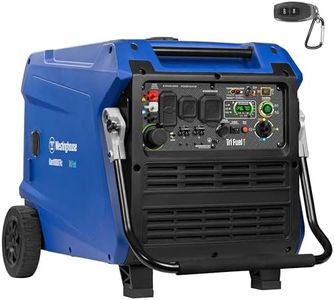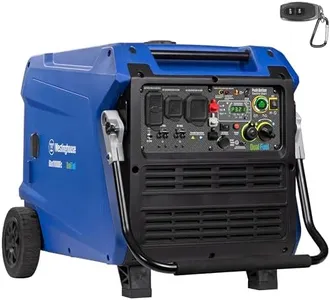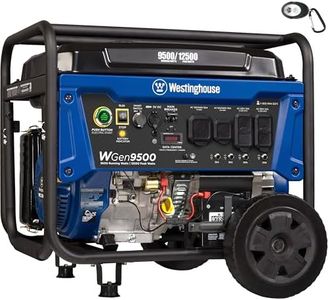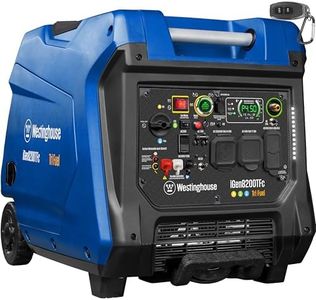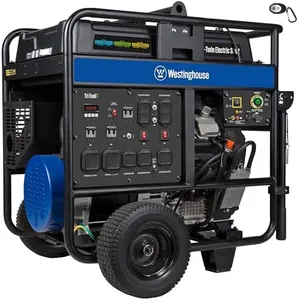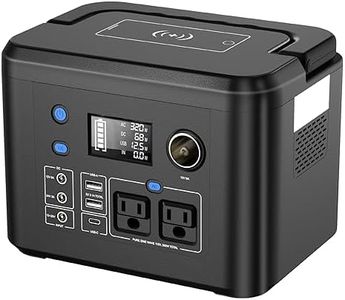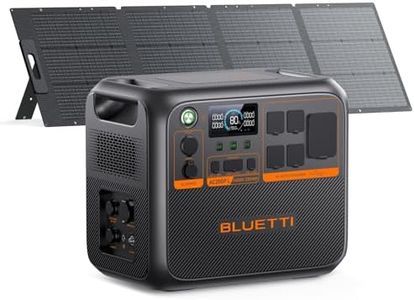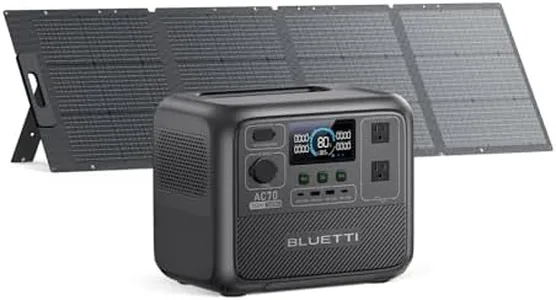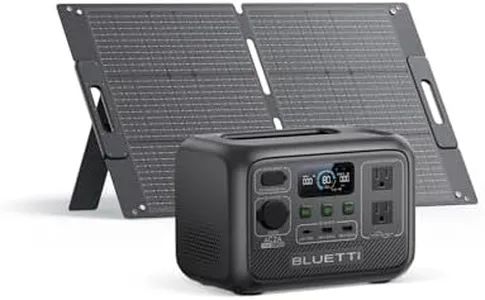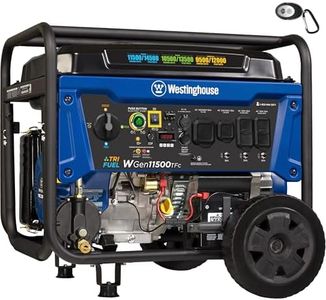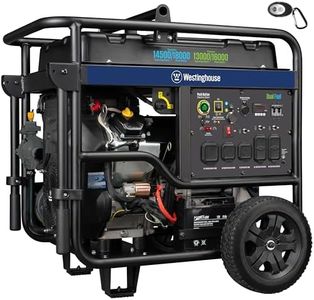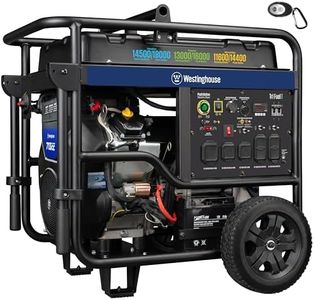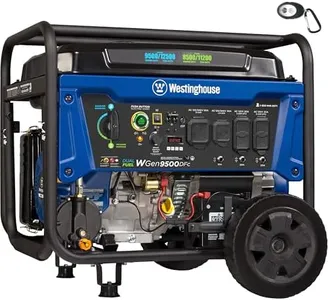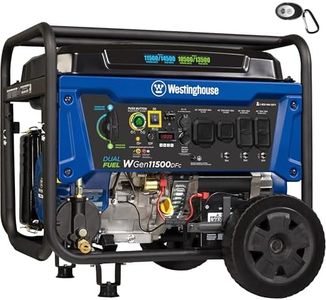10 Best Westinghouse Generators 2026 in the United States
Our technology thoroughly searches through the online shopping world, reviewing hundreds of sites. We then process and analyze this information, updating in real-time to bring you the latest top-rated products. This way, you always get the best and most current options available.

Our Top Picks
Winner
Westinghouse 11000 Peak Watt Tri-Fuel Portable Inverter Generator, Remote Start, Transfer Switch Ready, Gas/Propane/Natural Gas Powered, Low THD, Safe for Electronics, Parallel Capable, CO Sensor
Most important from
1325 reviews
The Westinghouse iGen11000TFc is a powerful tri-fuel inverter generator offering up to 11,000 peak watts on gasoline, with slightly less power on propane and natural gas. This flexibility in fuel types—gasoline, propane, or natural gas—makes it highly adaptable depending on fuel availability and cost. Thanks to inverter technology, it runs more quietly than traditional generators (around 76 dBa) and adjusts its engine speed to save fuel, helping extend run time to about 19 hours on a full 7.9-gallon gas tank. This can save you money and reduce refueling stops during use.
The generator is designed for whole-home backup and RV use, featuring 120/240V outlets that are ready for easy connection via transfer switches or interlock kits. It includes convenient safety features like a carbon monoxide sensor and automatic low-oil shutdown for peace of mind. Starting is made simple with a remote electric start, so no manual pulling is needed. The built-in LED display shows useful info like remaining run time and fuel level, making operation straightforward.
This generator weighs 191 pounds and measures over 30 inches long, making it less portable if you need something lightweight for camping or occasional use. While it has flat-free tires for easier movement, transporting it still requires effort. If you want a reliable, heavy-duty generator capable of running your home during outages or powering large tools, this model fits well. However, if portability and light weight are your top priorities, you might find it bulky.
Most important from
1325 reviews
Westinghouse 11000 Peak Watt Dual Fuel Portable Inverter Generator, Remote Electric Start, Transfer Switch Ready, Gas and Propane Powered, Low THD - Safe for Electronics, Parallel Capable, CO Sensor
Most important from
1325 reviews
The Westinghouse 11000 Peak Watt Dual Fuel Portable Inverter Generator is a robust choice for those needing reliable power at home or on the go. With a strong output of 9000 running watts (gasoline) and 8100 running watts (propane), it easily meets the demands of most residential applications. One of its standout features is the dual fuel capability, allowing you to switch between gasoline and propane, which provides flexibility and convenience depending on your availability of fuel. The runtime is impressive too, lasting up to 17 hours on a full fuel tank, making it suitable for extended use, especially during power outages or outdoor activities.
Additionally, the remote electric start is a major plus, as it allows for easy operation without needing to pull a cord, and the included safety features like the CO sensor enhance its usability. The LED data center is also user-friendly, providing clear information about fuel levels and power output.
The generator is quite heavy at 187.4 pounds, which may hinder portability for some users. While it does have wheels, transporting it over uneven surfaces might be a bit challenging. Noise levels are another consideration; while it is designed to be quieter than traditional models, it can still be noticeable, especially in quieter settings. Furthermore, the minimal assembly required is beneficial, but some users may find the setup instructions unclear.
Most important from
1325 reviews
Westinghouse Outdoor Power Equipment 12500 Peak Watt Home Backup Portable Generator, Remote Electric Start with Auto Choke, Transfer Switch Ready 30A & 50A Outlets, Gas Powered
Most important from
27492 reviews
The Westinghouse Outdoor Power Equipment 12500 Peak Watt Home Backup Portable Generator is a robust and reliable option, ideal for residential use. With a substantial power output of 9500 running watts and 12500 peak watts, it’s capable of handling heavy-duty needs, including powering multiple appliances during a power outage. This generator runs on gasoline, providing up to 12 hours of runtime on a 6.6-gallon fuel tank, which is quite efficient for prolonged use. The fuel gauge is a handy feature for monitoring fuel levels easily.
It comes with various outlets, including two GFCI 120V standard household receptacles, one transfer switch ready 120V outlet, one RV ready 120/240V outlet, and two USB ports, all with safety covers, making it versatile and convenient for different usage scenarios. The heavy-duty 457cc engine is durable, with features like an automatic low oil shutdown and a digital hour meter to ensure longevity and easy maintenance. Starting the generator is hassle-free with options for remote start using a key fob, electric start, and recoil start.
This plug-and-play model is ready to use out of the box with minimal assembly, and it includes useful accessories like a battery charger, engine oil, oil funnel, and a tool kit. Weighing 220 pounds, it is quite hefty, which may affect portability despite its built-in wheels. The generator is EPA compliant and backed by a three-year limited warranty, indicating reliable customer support and service options. This generator is an excellent choice for those needing a powerful, feature-rich backup power solution at home.
Most important from
27492 reviews
Buying Guide for the Best Westinghouse Generators
When choosing a Westinghouse generator, it's important to consider your specific needs and how you plan to use the generator. Whether you need it for home backup power, camping, or worksite use, understanding the key specifications will help you make an informed decision. Here are the key specs to consider and how to navigate them:FAQ
Most Popular Categories Right Now
